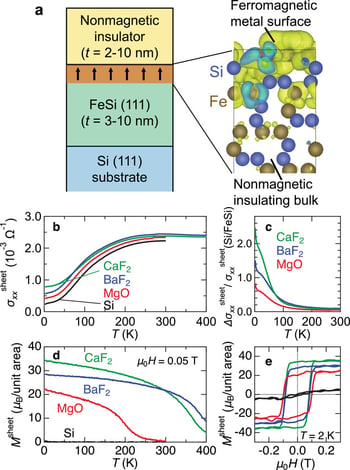Authors
Tomohiro Hori, Naoya Kanazawa, Motoaki Hirayama, Kohei Fujiwara,Atsushi Tsukazaki, Masakazu Ichikawa, Masashi Kawasaki, Yoshinori Tokura
Abstract
Strongly spin–orbit coupled states at metal interfaces, topological insulators, and 2D materials enable efficient electric control of spin states, offering great potential for spintronics. However, there are still materials challenges to overcome, including the integration into advanced silicon electronics and the scarce resources of constituent heavy elements of those materials. Through magneto-transport measurements and first-principles calculations, here robust spin–orbit coupling (SOC)-induced properties of a ferromagnetic topological surface state in FeSi and their controllability via hybridization with adjacent materials are demonstrated. In comparison to the case of its naturally oxidized surface, the ferromagnetic transition temperature is greatly increased beyond room temperature and the effective SOC strength is almost doubled at the surface in proximity to a wide-bandgap fluoride insulator. Those enhanced magnetic properties enable room-temperature magnetization switching, being applicable to spin–orbit torque based spintronic devices. Realization of strong SOC in the noble-metal-free silicon-based compound will accelerate spintronic applications.

Advanced Materials: https://onlinelibrary.wiley.com/doi/10.1002/adma.202206801